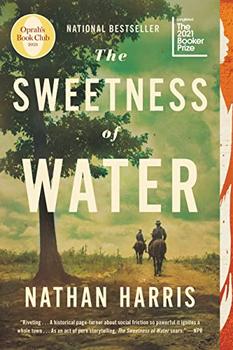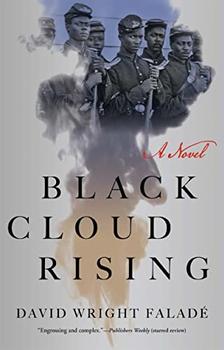Summary | Excerpt | Reviews | Beyond the book | Read-Alikes | Genres & Themes | Author Bio

Nathan Harris's dazzling first novel, The Sweetness of Water, is set in the American South just after the Civil War. As the story opens, the African American population has been freed from slavery, but no provisions have been made to accommodate the thousands of newly liberated men, women and children; young troops are returning from combat to find their society has changed; and those who have managed to retain their wealth and power are maneuvering to maintain their influence.
It's a time of reckoning, too, as some begin to realize just how much they've lost and how hard it will be to rebuild their lives. George Walker is one of these; a farmer who was too old and infirm to take part in the war himself, George is told that his only son was killed near the end of the conflict. In addition, his relationship with his wife Isabelle is complicated, so much so that whole days go by without them speaking, and he delays telling her of their son's demise. On a stroll around his property to contemplate what he'll say to her, he stumbles upon two recently liberated men, brothers Prentiss and Landry, who have set up a camp in his woods. The pair are cold and hungry, and George provides them with food and shelter, paying them to work his property. This doesn't sit well with residents of the nearby town, who resent the good wages given to these men, and conflict ensues.
This description may make it sound like the plot is relatively straightforward, but that's definitely not the case. Very little of the narrative unfolds as one might expect, and indeed, that's one of the many highlights of Harris's debut. Events and actions always make sense, but the author eschews the standard paths other storytellers have taken, creating a unique piece of literature that's utterly surprising, start to finish.
There are so many aspects of this novel I felt were sheer perfection. The plot is intricate and unpredictable, the characters have remarkable depth, and there's enough detail about the era for wonderful historical fiction. Harris's portrayal of the grieving process is dead-on, as is his perception of the complexities of human nature.
Perhaps the biggest standout, though, is the writing style. The author captures the cadence of 19th-century prose, adding to the story's authentic feel while spinning lush descriptions of time and place. Harris writes of George's first encounter with the brothers:
The log beneath him yawned and George's rear end sank into the waterlogged mess. Only as he moved to stand, to pat himself dry, did he see them sitting before him. Two Negroes, similar in dress: white cotton shirts unbuttoned, britches as ragged as if they'd fitted their legs into intertwined gunnysacks. They stood stock-still, and if the blanket before them had not swayed in the wind like some flag to signal their presence, they might have disappeared in the foreground entirely.
The book's cover mentions a "forbidden romance between two Confederate soldiers" and a murder that occurs when the liaison is discovered. This relationship isn't a major thematic component, though the one scene regarding the young men's tryst is pivotal, as it connects to the main storyline and fuels the rest of the novel.
The Sweetness of Water isn't a fast read. This is partly due to the author's narrative technique, particularly at the start of the book as one adjusts to the rhythm of the text. But some readers may also find the novel's intensity necessitates slower reading; there were several times when I had to set it down for the day because an unexpected twist left me reeling. There were other times when I stepped away because I anticipated a tragic end to a storyline, only to find when I resumed reading that the author veers away from the assumed trajectory. Still, there were certainly scenes that were painful to read, and overall, it was an unforgettable, deeply emotional experience.
In short, The Sweetness of Water is one of the finest novels I've read this year, and certainly worthy of all the attention it's garnering. I highly recommend it to anyone with an interest in the time period and those looking for a truly memorable story.
![]() This review was originally published in The BookBrowse Review in December 2021, and has been updated for the
June 2022 edition.
Click here to go to this issue.
This review was originally published in The BookBrowse Review in December 2021, and has been updated for the
June 2022 edition.
Click here to go to this issue.

If you liked The Sweetness of Water, try these:

by Eleanor Shearer
Published 2023
Rare. Moving. Powerful. This beautiful, page-turning and redemptive story of a mother's gripping journey across the Caribbean to find her stolen children in the aftermath of slavery is a remarkable debut.

by David Wright Falade
Published 2023
Black Cloud Rising is a compelling and important historical novel that takes us back to an extraordinary moment when enslaved men and women were shedding their bonds and embracing freedom.
Your guide toexceptional books
BookBrowse seeks out and recommends the best in contemporary fiction and nonfiction—books that not only engage and entertain but also deepen our understanding of ourselves and the world around us.